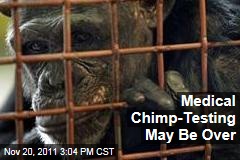
Based on real, cutting-edge science, Are You Smarter Than a Chimpanzee? makes us laugh, makes us think and above all makes us question our assumptions about our place in the animal kingdom. Along the way, Ambridge debunks a plethora of common myths about animals and reveals the bizarre and wonderful science being done at the extreme end of zoology, where animal psychologists are designing personality tests for donkeys and logic problems for pigeons. Are You Smarter Than a Chimpanzee? is a collection of ingenious tests, puzzles, quizzes and games that pits the reader against a range of extraordinary creatures to show that, from dolphins that understand grammar to parrots that can add up, via fetishist quails and the ant-swarms outsmarting the world's best mathematicians, the animal kingdom is more than a match for anything mankind has to offer. But all animals - us included - are pretty special. Risk-taking behavior in both adolescent chimpanzees and humans appears to be deeply biologically ingrained, but increases in impulsive behavior may be specific to human teens, Rosati said.What makes humans special? What makes us different from animals? Psy-Q author Ben Ambridge's entertaining, illuminating new book has a surprising answer: less than you might think. However, adolescent chimpanzees weren't happy about waiting for the extra banana slices and they threw more tantrums during the one-minute delay than adult chimpanzees. "Prior research indicates that chimpanzees are quite patient compared with other animals, and our study shows that their ability to delay gratification is already mature at a fairly young age, unlike in humans," Rosati said. Human teens tend to be more impulsive than adults so they would be more likely to take the immediate reward. The second test, modeled after the famous "marshmallow test" with human children, examined delayed gratification where chimpanzees could receive one banana slice immediately or wait for one minute to receive three slices.īoth adolescent and adult chimpanzees chose the greater delayed reward at a similar rate. Saliva samples also were collected to track hormone levels.ĭuring several rounds of the test, adolescent chimpanzees took the risky option more often than adult chimpanzees, but adolescents and adults had similar negative reactions when they received cucumber. The chimpanzees' emotional reactions and vocalizations were recorded, including moans, whimpers, screams, banging on the table or scratching themselves. The chimpanzees could play it safe and get the peanuts, or take a chance for some coveted banana at the risk of ending up with unappetizing cucumber. The other container concealed either an unliked food - a cucumber slice - or a favorite food - a banana slice. One container always contained peanuts, a food that chimpanzees somewhat like.


In the first test, adolescent and adult chimpanzees could choose between two containers in a gambling task.

Like humans, chimpanzees show rapid changes in hormone levels during adolescence, start forming new bonds with peers, show increases in aggression and compete for social status. The research was published online in the Journal of Experimental Psychology: General.Ĭhimpanzees can live to be 50 years old and experience adolescence at about 8 to 15. The chimpanzees voluntarily participated in the games in order to receive food treats. The researchers conducted two tests involving food rewards with 40 wild-born chimpanzees at a sanctuary in Republic of Congo. "Our findings show that several key features of human adolescent psychology are also seen in our closest primate relatives." "Adolescent chimpanzees are in some sense facing the same psychological tempest that human teens are," said lead researcher Alexandra Rosati, PhD, an associate professor of psychology and anthropology at the University of Michigan.


 0 kommentar(er)
0 kommentar(er)
